昆明医科大学考博历年病理学试题(2009-2017)
博士病理生理学试题及答案
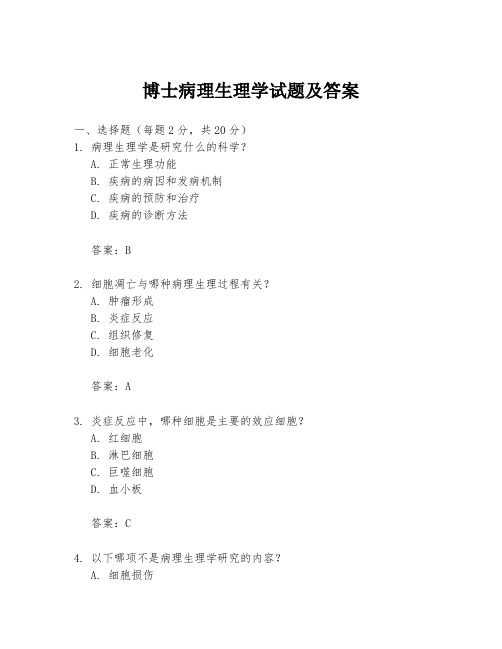
博士病理生理学试题及答案一、选择题(每题2分,共20分)1. 病理生理学是研究什么的科学?A. 正常生理功能B. 疾病的病因和发病机制C. 疾病的预防和治疗D. 疾病的诊断方法答案:B2. 细胞凋亡与哪种病理生理过程有关?A. 肿瘤形成B. 炎症反应C. 组织修复D. 细胞老化答案:A3. 炎症反应中,哪种细胞是主要的效应细胞?A. 红细胞B. 淋巴细胞C. 巨噬细胞D. 血小板答案:C4. 以下哪项不是病理生理学研究的内容?A. 细胞损伤B. 细胞死亡C. 细胞分裂D. 细胞再生答案:C5. 病理生理学中的“应激反应”是指什么?A. 身体对外界刺激的适应性反应B. 身体对疾病状态的防御性反应C. 身体对感染的免疫反应D. 身体对药物的代谢反应答案:A二、判断题(每题1分,共10分)1. 病理生理学是医学的一个分支,主要研究疾病的病因、发病机制和转归。
(对)2. 病理生理学与临床病理学是同一概念。
(错)3. 细胞凋亡是一种病理性死亡过程。
(错)4. 炎症是机体对损伤因子的一种防御性反应。
(对)5. 病理生理学研究的重点是疾病的预防和治疗。
(错)三、简答题(每题5分,共30分)1. 简述病理生理学的主要研究内容。
答案:病理生理学主要研究疾病的发生、发展过程,包括病因、发病机制、病理变化以及机体对疾病的反应和适应。
2. 描述细胞凋亡与细胞坏死的区别。
答案:细胞凋亡是一种程序化的细胞死亡过程,通常没有炎症反应,是机体正常生理过程的一部分。
而细胞坏死是非程序化的,通常由于外界因素如缺氧、感染等引起,伴随炎症反应。
3. 炎症反应的四个主要表现是什么?答案:炎症反应的四个主要表现是红、肿、热、痛。
4. 什么是病理性应激反应?它在疾病中的作用是什么?答案:病理性应激反应是机体在疾病状态下对内外环境变化的适应性反应。
它有助于机体抵抗损伤,但过度或不适当的应激反应可能导致疾病的发展和恶化。
四、论述题(每题15分,共30分)1. 论述病理生理学在临床诊断和治疗中的重要性。
昆明医科大学病理学2009--2019年考博真题

二、 问答题:(每题10分,共70分) 1.肝硬化时假小叶是如何形成的,假小叶有哪些形态特点? 2.按照肿瘤的命名原则,请列举发生于前臂的良恶性肿瘤各10个。 3.从病因、发病机制、病理变化、主要临床表现和影像学特点比较大叶性肺炎 与小叶性肺炎的不同点。 4.请举出5种导致锁骨上淋巴结肿大的疾病或病变,并简述肿大淋巴结的病变 特点。 5.尸体解剖发现死者双肾体积肿大,包膜紧张,颜色暗红,表面及切面散在出 血点,肾皮质增宽。镜下大多数肾小球体积增大,球囊内细胞数目显著增多, 肾小管腔内见蛋白、红细胞和白细胞。试分析: (1)该病例的病理诊断是什么?
第1页 共1页
昆明医科大学
2011年攻读博士学位研究生入学考试试题
考试科目:病理学 注意:所有答案一律写在答题纸上,写在试题纸上或其他地方一律不给分。 一、名词解释:(每题3分,共30分) 1.Metaplasia 2.Granulation tissue 3.Paget disease 4.Infarct 5.Primary complex 6.Gumma 7.Piecemeal necrosis 8.Reed-Sternberg cell 9.Aschoff body
第1页 共1页
尸检:主动脉壁增厚,内膜可见灰黄色斑块,主动脉局部内膜分离,其间可见血 凝块,冠状动脉内膜增厚,狭窄。 问题1:该患者的死亡原因是什么? 2:叙述心血管病变形成的过程。
第1页 共1页
昆明医科大学
2013年攻读博士学位研究生入学考试试题
二,问答题(每题10分,共70分) 1,简述小叶性肺炎,肾盂肾炎,流行性脑脊膜炎的病变共性和不同点(病 因,发病年龄,感染途径和病变特点) . 2.病人出现血尿,请分析可导致血尿的疾病和病变特点(至少3种) . 3.试述良性高血压晚期脑,心脏和肾脏的主要病理改变及后果. 4. 病人的手指被刀切伤,深达肌层,试述伤口的愈合过程和影响伤口愈合 的因素. 5. 以肺癌为例,试述恶性肿瘤的扩散规律. 6.试述心衰细胞,枭眼细胞,伤寒细胞,镜影细胞和泡沫细胞见于何种疾 病或病变以及镜下形态特点. 7,患者,男,50岁,因呕血急诊入院.既往患乙型肝炎16年.查体见面部 和胸部有蜘蛛痣,腹壁静脉怒张,腹水征阳性.实验室检查: HBsAg(+),HBcAb(+),HBeAg(+),ALT 明显增高,AFP 明显增高.B 超检查有大 小不等的结节. 请分析: (1) 该病人患何疾病? (2) 该疾病的发生发展过程? (3) 请解释为何出现上述临床表现?
昆明医科大学外科学专业课考博真题博士试题
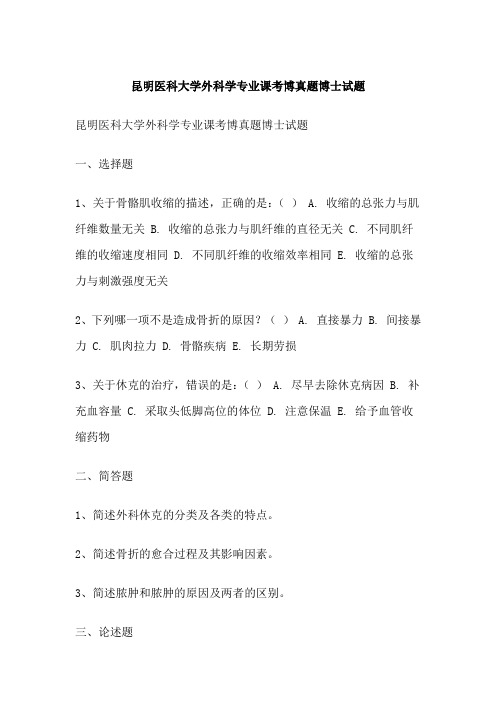
昆明医科大学外科学专业课考博真题博士试题昆明医科大学外科学专业课考博真题博士试题一、选择题1、关于骨骼肌收缩的描述,正确的是:() A. 收缩的总张力与肌纤维数量无关 B. 收缩的总张力与肌纤维的直径无关 C. 不同肌纤维的收缩速度相同 D. 不同肌纤维的收缩效率相同 E. 收缩的总张力与刺激强度无关2、下列哪一项不是造成骨折的原因?() A. 直接暴力 B. 间接暴力 C. 肌肉拉力 D. 骨骼疾病 E. 长期劳损3、关于休克的治疗,错误的是:() A. 尽早去除休克病因 B. 补充血容量 C. 采取头低脚高位的体位 D. 注意保温 E. 给予血管收缩药物二、简答题1、简述外科休克的分类及各类的特点。
2、简述骨折的愈合过程及其影响因素。
3、简述脓肿和脓肿的原因及两者的区别。
三、论述题1、论述外科感染的概念、分类、临床表现及治疗方法。
2、论述恶性肿瘤的治疗方法及其优缺点。
3、论述甲状腺手术的手术适应证及其手术治疗原则。
四、分析题有一位青年男性患者,因“左上腹疼痛5天,加重2天”来院就诊。
患者5天前无明显诱因出现左上腹疼痛,疼痛为阵发性,可忍受,无放射痛,无畏寒、发热,无恶心、呕吐,无胸闷、心悸,大小便正常。
患者有慢性乙型肝炎病史5年,未经系统治疗,平时经常熬夜、劳累。
体格检查:体温37.5℃,心率90次/分,呼吸20次/分,血压120/80mmHg。
左上腹轻压痛,无反跳痛,墨菲氏征阴性,肝脾肋下未触及。
实验室检查:白细胞10×10^9/L,中性粒细胞比例70%,淋巴细胞比例30%,Hb120g/L,血小板150×10^9/L。
肝功能检查:谷丙转氨酶(ALT)20U/L,谷草转氨酶(AST)30U/L,总胆红素(TBIL)20μmol/L。
乙肝病毒检测:HBsAg阳性,HBeAg阳性,HBcAb阳性。
根据以上病例特点,请分析并回答以下问题:1、该患者最可能的诊断是什么?并请列出你的诊断依据。
2009昆明医学院博士学位研究生招生入学考试英语试题
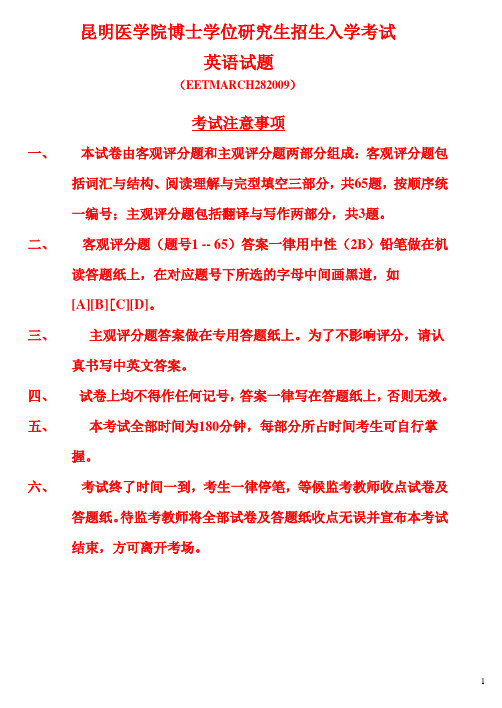
昆明医学院博士学位研究生招生入学考试英语试题(EETMARCH282009)考试注意事项一、本试卷由客观评分题和主观评分题两部分组成:客观评分题包括词汇与结构、阅读理解与完型填空三部分,共65题,按顺序统一编号;主观评分题包括翻译与写作两部分,共3题。
二、客观评分题(题号1 -- 65)答案一律用中性(2B)铅笔做在机读答题纸上,在对应题号下所选的字母中间画黑道,如[A][B][C][D]。
三、主观评分题答案做在专用答题纸上。
为了不影响评分,请认真书写中英文答案。
四、试卷上均不得作任何记号,答案一律写在答题纸上,否则无效。
五、本考试全部时间为180分钟,每部分所占时间考生可自行掌握。
六、考试终了时间一到,考生一律停笔,等候监考教师收点试卷及答题纸。
待监考教师将全部试卷及答题纸收点无误并宣布本考试结束,方可离开考场。
Part I V ocabulary and Structure (20 points, 30 minutes)Directions: There are 20 incomplete sentences in this part. For each sentence there are four choices marked A, B, C, D. Choose the ONE answer that best completes the sentence. Then mark the corresponding letter on the Answer Sheet with a single line through the center.1.The school committee hoped that their choice of play would be ______ with the students andtheir parents.A. recognizedB. popularC. favorableD.fascinated2.But the Swiss discovered long years ago that constant warfare brought them ________suffering and poverty.A. nothing butB. anything butC. none other thanD. nomore than3.The small mountain village was _______ by the snow for more than one month.A. cut backB. cut outC. cut offD. cutaway4.The American peopl e’s ________ of being polite is different from that held here in China.A. mindB. conceptC. considerationD.thought5.The ______ of AIDS has led to an expansion in research seeking a cure.A. innovationB. selectionC. proliferationD.conviction6.When he was asked about the missing briefcase, the man _______ ever seeing it.A. refusedB. opposedC. resistedD. denied7.Modern appliances _______ us from a good deal of household work. For instance, the dryerfrees us from hanging the laundry.A. escapeB. benefitC. liberateD.comfort8.Our boss, Mr. Thompson, _______ a raise in salary for ages, but nothing has happened yet.A. was promisingB. has been promisingC. promisedD. haspromised9.People under stress have performed ________ feats of strength, like lifting an automobile offan accident victim.A.extraordinary B. specific C. abrupt D. abnormal10.After so many weeks without rain, the ground quickly ______ the little rain that fell last night.A. skippedB. soakedC. retrievedD.absorbed11.The government official can hardly find sufficient grounds ________ his arguments in favour ofthe revision of the tax law.A. on which to baseB. which to be based onC. to base on whichD. on which to be based12.Hydrogen is one of the most important elements in the universe ________ it provides thebuilding blocks from which the other elements are produced.A. so thatB. but thatC. provided thatD. inthat13. What are your _______ for judging a bottle of wine?A. regulationsB. rulesC. premisesD. criteria14.He was reading a piece of science fiction, completely _______ to the outside world.A. to be lostB. lost C. losingD. having lost15.Is it possible to make an early _______ to have my hair cut tomorrow?A. enrollmentB. engagementC. appointmentD. arrangement16.Since I could not see anything through the microscope, _ ____my careful adjustment, I gaveup.A. for allB. above allC. after allD. in all17.The _______ populated area was a breeding place for infectious diseases.A. denselyB. sparselyC. improperlyD. poisonously18.Renewing my driver’s license today is _________. Otherwi se, the license will expire atmidnight.A. imaginativeB. feasibleC. imperativeD.empirical19.An atom bomb would ________ a city.A. destroyB. damageC. moistD. wet20. All flights _______ because of the snowstorm, many passengers could do nothing but take thetrain.A. had been cancelledB. were cancelledC. have been cancelledD. having been cancelled Part II Reading Comprehension. (25 points, 60 minutes)Directions: There are 5 passages in this part. Each passage is followed by some questions or unfinished statements. For each of them there are four choices marked A, B, C, and D.You should decide on the best choice and mark the corresponding letter on the AnswerSheet with a single line through the center.Questions 21 to 25 are based on the following passage.Language is often irrational even in the way it combines words into sentences – in its synthesis. If language were perfectly rational in this respect, we should be able to handle words like the nine digits in arithmetic, and combine them into sentences at pleasure by applying a few simple grammaticalrules. In practice, however, we find that a great part of all languages consists of a limited number of natural sentences, only some of which admit of being formed a priori and freely modified by the substit ute of the other words, as when from “have”, “ink”, “pen”, we make up such sentences as “I have the ink”, “Who has the pen?” “Who has the ink?” “He has the ink,” and so on.But just as we cannot go on speaking long without using irregular inflections, so also we cannot go on speaking naturally for any length of time without using irregular combinations of words –combinations which cannot be constructed a priori. The sentences which make up natural speech are of two kinds – general sentences, such as those which have just been given, and special sentences or idioms, such as “how do you do?” “never mind”, which are really on a level with simple words, such as salutation, indifference, and like them, have to be learnt one by one, in the same way as the irregularities of the grammar. Many of them, indeed, have meanings inconsistent with those of the words of which they are made up. Thus “do” never has the meaning it has in “how do you do?” and “help” in the idiomatic expression “I could not help being late” has the meaning “prevent” “avoid”, which is the exact contrary of its ordinary meaning.Again, even in those cases in which the grammar and dictionary allow us to express an idea by various combinations of words, there is often only one of these combinations in actual use. Those who have had to do Latin prose composition know that the main difficulty of the art consists in having an instinctive knowledge of what combinations to avoid. French has a similar character. English and Greek are much freer in this respect, a fact which many foreigners find it difficult to realize. When they ask me such questions as “Can one speak of an ‘elegant supper?” “Can you say, ‘He was bad last night?” I always answer that English is a free language, and that there is nothing t o prevent any one calling a supper “elegant” although I do not remember ever doing so myself. Nevertheless, English has its imitations as well as other languages. Foreigners’ English often presents the curious spectacle of a language constructed on strict grammatical principles, but with hardly a single genuinely English sentence in it.21. Language is irrational in that ___________.A.we can combine words by using simple grammatical rulesB.words in a language are like the nine digits in arithmeticC.the meaning of a sentence can be inferred from the meanings of the words in itD.the meaning of a sentence does not always conform to the meaning of the words in it22.According to the author, __________.A.all languages have a limited number of natural sentencesB.not all sentences in a language can be modified by substituting different wordsC.regular combinations of words should be avoided in our speechD.we should construct a priori before we combine words into sentences23.Which of the following is true?A.Grammatically correct sentences are definitely correct.B.Grammatically correct sentences are not necessarily used in practice.C. A sentence based on grammar should be idiomatic.D. A sentence in practical use must be rational.24.The author thinks it ________ to call a supper “elegant”.A. not idiomaticB. impossibleC. wiseD. good English25.The main idea of the passage is that ________.A.We cannot speak by strict grammatical rulesB.No rule but has exceptionsC.There are two kinds of sentences in a languagenguage has strict grammatical rules to followQuestions 26 to 30 are based on the following passage.Predicting the future is always risky. But it's probably safe to say that at least a few historians will one day speak of the 20th century as America's “Disney era ”. Today, it's certainly difficult to think of any other single thing that represents modern America as powerfully as the company that created Mickey Mouse. Globally, brands like Coca-Cola and McDonalds may be more widely known, but neither encapsulates 20th-century America in quite the same way as Disney. The reasons for Disney's success are varied and numerous, but ultimately the credit belongs to one person — the man who created the cartoon and built the company from nothing, Walt Disney. Ironically, he could not draw particularly well. But he was a genius in plenty of other respects. In business, his greatest skills were his insight and his management ability. After setting himself up in Hollywood, he single-handedly pioneered the concepts of branding and merchandising — something his company still does brilliantly today.But what really distinguished Disney was his ability to identify with his audiences. Disney always made sure his films championed the “ little guy ”, and made him feel proud to be American. This he achieved by creating characters that reflected the hopes and fears of ordinary people. Some celebrated American achievements — Disney's very first cartoon Plane Crazy, featuringa silent Mickey Mouse, was inspired by Charles Lindbergh's flight across the Atlantic. Others, like the There Little Pigs and Snow White and the Seven Dwarves, showed how, through hard work and helping one's fellow man, or Americans could survive social and economic crises like the Great Depression.Disney's other great virtue was the fact that his company — unlike other big corporations —had a human face. His Hollywood studio —the public heard —operated just like a democracy, where everyone was on first name terms and had a say in how things should be run. He was also regarded as a great patriot because not only did his cartoons celebrate America, but, during World War II, studios made training films for American soldiers.The reality, of course, was less idyllic. As the public would later learn, Disney's patriotism had an unpleasant side. After a strike by cartoonists in 1941, he became convinced that Hollywoodhad been infiltrated by Communists. He agreed to work for the FBI as a mole, identifying and spying on colleagues whom he suspected were subversives.But, apart from his affiliations with the FBI, Disney was more or less the genuine article.A new book, The Magic Kingdom; Walt Disney and the American Way of Life, by Steven Watts, confirms that he was very definitely on the side of ordinary Americans — in the 30s and 40s he voted for Franklin Roosevelt, believing he was a champion of the workers. Also, Disney was not an apologist for the FBI, as some have suggested. In fact, he was always suspicious of large, bureaucratic organizations, as is evidenced in films like That Darned Cat, in which he portrayed FBI agents as bungling incompetents.By the time he died in 1966, Walt Disney was an icon like Thomas Edison and the WrightBrothers. To business people and filmmakers, he was a role model; to the public at large, he was “Uncle Walt ”—the man who had entertained them all their lives, the man who represented them all their lives, the man who represented all that was good about America.26. Walt Disney is believed to possess the following abilities EXCEPT ___________.A. paintingB. creativityC. managementD. merchandising27. According to the passage, what was the pleasant side of Disney’s patriotism?A. He sided with ordinary Americans in his films.B. He supported America’s war efforts in his own way.C. He had doubts about large, bureaucratic organizations.D. He voted for Franklin Roosevelt in the 30s and 40s.28. In the sixth paragraph the sentence “Disney was more or less the genuine article” means that__________.A. Disney was a creative and capable personB. Disney once agreed to work for the FBIC. Disney ran his company in a democratic wayD. Disney was sympathetic with ordinary people29. The writer’s attitude toward Walt Disney can best be described as __________.A. sympatheticB. objectiveC. criticalD. skeptical30. The word icon in the last paragraph means __________.A. an imageB. a pictureC. an object of great attentionD. a great scientistQuestions 31 to 35 are based on the following passage.Dramatically increasing costs of developing new drugs and more stringent regulatory requirements made by the U.S. Food and Drug Administration further dampened the drug industry’s appetite for jumping into new antibiotic research and development.The result was virtual paralysis in antibiotic development just when the resistance was careering out of control. “In 1991 an informal survey among pharmaceutical companies in the United States andJapan suggested that at least 50 percent of them had either diminished substantially or totally gotten out of antibacterial research,” says Shlaes. “People simply sloughed off the problem of resistance.”But it’s no surprise that bugs should develop resistance to our efforts to wipe them out. It’s only natural for an organism to do everything it can to evade its killer. By developing new drugs, we attempt to stay one step ahead of our microbial enemies, and the microbes furiously return the favor. Antibiotics actually promote resistance. For example, let’s say that Shoemaker’s young patient was indeed suffering from and ear infection. An antibiotic might wipe out most of those bad bugs, but a few might survive. If the child’s besieged immune system were capable of mopping up, all would be well. But if it weren’t, with the susceptible bacteria now dead, the resistant strains could spread like weed through a newly harvested fiel d. And if the child didn’t take the entire prescribed course of drugs, or if they were the wrong kind, more resistant strains might propagate.To compound the problem, antibiotics don’t just kill bad bugs, they also cut down innocent bystanders. That’s unfortunate, says Levy. “Non-disease-causing bacteria are essential parts of the body’s natural armor against invading infectious bacteria.” These benign microbes limit the spread of their dangerous brethren simply by being in the way. With them gone, the field is even more wide open to resistant bugs to grow rapidly.All that may be unintended result when antibiotics are used to cure disease. But much of antibiotic use is preventive – the penicillin given to the Vietnamese prostitutes, say, or antibiotics prescribed before surgery. Often the doses involved are comparatively low, and the drugs are given over long periods. This regime can be even more favorable for breeding resistance, as can low doses in animalfeed or in agriculture – or in antibacterial products like plastics, household cleaners, soaps, and toothpaste, a more recent menace.31. One of the reasons that made antibiotics research and development paralyzed is that __________.A. the cost of developing new drugs kept risingB. regulatory requirements are not so strictly observed as beforeC. there aren’t enough funds, and labors for drug industry to develop in this fieldD. the market demand is not high32. The case of Shoemaker’s young patient is taken to show that ___________.A. antibiotics can promote resistance of bugsB. antibiotics can kill all the bad bugsC. antibiotics can prevent the bugs from reproducing for goodD. antibiotics research is not well developed33. According to the text, which of the following statements in N0T true?A. Antibiotics kill innocent bacteria as well as bad bugs.B. If drugs were not taken properly, more resistant strains might breed.C. A person’s immune system plays a significant role in the effects of antibiotics.D. Antibiotics are not effective by and large.34. If non-disease-causing bacteria were killed, __________.A. the spread of infectious bacteria would slow downB. the positive effect of antibiotics would be proven fullyC. the spread of bad bugs would be freer and quickerD. resistant bugs would lose their ground to function35. In the last paragraph, it is inferred that ____________.A. preventive use of antibiotics leaves no room for bugs to develop resistanceB. low-dosed or long-term use of antibiotics can be a threat to our health as wellC. low-dosed or long-term use of antibiotics is not likely to breed resistance of bugsD. daily-used antibiotic products can thoroughly prevent the breed of resistant bugsQuestions 36 to 40 are based on the following passage.Until recently, questions about managed care focused on the issues of access to services, choices of doctors and waiting time. Now though, patients and employers are demanding to know more about their managed care plans. What percentage of breast cancer sufferers in a given plan survive? How many babies delivered are healthy? How many times a year do asthma sufferers get rushed to the emergency room?The emphasis on outcomes, though, is relatively new. The Foundation for Accountability a Portland(Ore.)-based group, is developing the first comprehensive set of measurements. Patients, employers and government purchasers of health plans formed the foundation 18 months ago to improve quality in health care delivery.So far, the group has developed seven sets of measurements about specific diseases such as asthma, breast cancer, diabetes and heart disease. No community has yet begun to use these measurements. But David Lansky, the foundation’s president, said that M edicare is preparing to test them in Florida, Minnesota and Washington State. It’s a four-year project and involves gathering data for analysis and giving feedback to doctors and managed care plans.Take breast cancer. The foundation measures quality of care three ways. It tries to determine whether the health plan has steps in place that lead to good care. For example, does it allow mammograms as often and early in life as the latest guidelines suggest? Does the patient understand all of the treatment options available to her?Patient satisfaction is another consideration. Does the health plan communicate well with the patient? Is the patient involved in treatment decisions? Does the patient have access to specialists? How long does the patient have to wait to get the results of a breast biopsy?The result, or outcome, is the final question. People want to know how long patients with breast cancer live and avoid recurrences of their disease. Do they have access to reconstructive surgery and counseling? Do they return to normal life as soon as possible?The ultimate goal, Lansky said, is to get this information into the hands of consumers while they’re choosing a doctor, a hospital or a health maintenance organization (HMO)36. Which of the following statements is true concerning people’s attention to managed care service?A.They used to focus on outcomes.B.They don’t care about access to services, choices of doctors and waiting time for the timebeing.C.They begin to stress the outcomes.D.They begin to stress delivery time.37. The Foundation for Accountability is an organization that __________.A. was set up to improve quality in health care deliveryB. has got its sets of measurements into effectC. is formed exclusively by patients and government purchasers of health plansD. develops sets of measurements about minor diseases38. The set of measurements will be tested ___________.A. over half a decadeB. in three states of the United StatesC. in PortlandD. and the result will be reported to patients other than doctors39. Regarding measuring quality of breast cancer care, it is mentioned in the text that _________.A. it takes three ways to measure, i.e., doctors’ attitude, patient satisfaction and o utcomeB. the Foundation worked out three sets of measurementC. the measurement should take the communication between patient and the health plan intoconsiderationD. the outcome is the least important.40. The significance of measurements mainly lies in that __________.A. health care will be more popularly accepted by consumersB. the Foundation can make some profits by providing informationC. consumers divert their attention on health care from choices of doctors to outcomesD. consumers can have information about the quality of health care when they needQuestions 41 to 45 are based on the following passage.One method of determining your strong points is to appraise past performance honestly and to draw a balance sheet of your assets and liabilities. An appraisal of this sort might profitably be discussed with a friend to obtain a fresh, objective viewpoint on what one should try to do.Second, in job hunting it is important to advertise yourself. One young man – fortunately, a wealthy one – has turned his worries over to the bank where he keeps his money. He has told the bank that sooner or later something will turn up which he would be glad to have called to his attention. To be sure, this man is an exception. Many others, however, are content to call on their friends of business acquaintances, mention that they are “looking” not leaving a clear impression for what, and expect to get results.Job hunting is the hardest of all types of work, and it can be the most interesting. An orderly planned approach is essential. Let us assume you have decided what you want to do, believe and can prove you can do it well, know where you are willing to live, and have an idea of your worth. In short, you have prepared yourself to look for a job.No matter how flexible you are, there are certain companies to which you might be useful and many others to which you will not. Type of industry and size of company are two limiting factors to begin with, aside from your own personal preferences as to location, travel, salary, etc.41. If you want to have a self-appraisal, you should ___________.A. be aware of your strong pointsB. be honest with yourselfC. have enough assetsD. have a balanced mind42. The author suggests that one need discuss with a friend about jobs ___________.A.because friends might know more job opportunitiesB.because friends know you better than you doC.because friends are more honest than you areD.because friends can be more objective43. The example of the young man is used to show that ___________.A. even rich people need to look for a jobB. one should look for the right person in job huntingC. the young man is rich and fortunateD. self-advertising is important in job hunting44. When you prepare yourself to look for a job, you should do all the followingEXCEPT___________.A.knowing what you want to doB. deciding what you candoC. being flexible for everythingD. knowing your ownworth45. The passage discusses ____________.A. the job seekerB. the job marketC. the ideal jobsD. limiting factors in job huntingPart III Cloze (20 points, 1 point each, 30 minutes)Directions: There are 20 blanks in the following passage. For each blank there are four choices marked A, B. C, and D. You should choose the One that best fits into the passage. Then mark the corresponding letter on the Answer Sheet with a single line through the center.The normal human daily (46) of activity is of some 7-8 hours’ sleep (47) alternation with some 16-17 hours’ cycle and that the sleep normally coincides(48) the hours of darkness. Ourpresent concern is with how easily and to what extent this (49) can be modified.The question is no mere academic one. The ease (50) people can change from working in the day to working at night is a (51) of growing importance in industry where automation (52)round-the-clock working of machines. It normally (53) from five days to one week for a person to adapt to a (54) routine of sleep and wakefulness, sleeping during the day and working at night. (55) , it is often the case in industry that (56) are changed every week. This means that no sooner has he (57) one routine (58) he has to change to another, (59) much of his time (60) neither working nor sleeping very well .One answer would seem to be better periods on each sh ift, a month, or even three months. (61) , recent research has shown that people (62) such systems will revert to go back to their(63) habits of sleep and wakefulness during the week-end and that this is quite enough to destroy any(64) to night work built up during the week. The only real solution appears to be to hand over the night shift to those night workers whose(65) may persist through all week-ends and holidays.。
昆明医科大学外科学2010,2011,2017,2018年考博真题
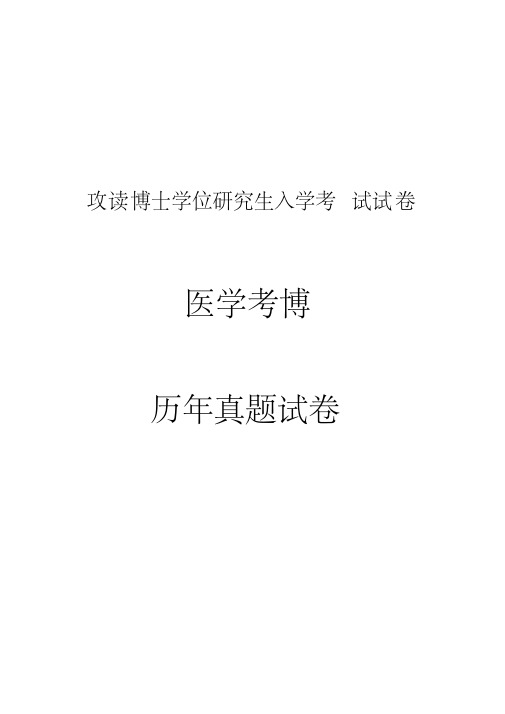
攻读博士学位研究生入学考试试卷医学考博历年真题试卷昆明医学院2010年博士入学考试外科学试题第一大部分必做题一、单项选择(一个2分,10题,共20分)1、灭菌2、病例:钾代谢异常、脱水类型3、高渗性脱水诊断指标4、ARDS的病理改变5、疝气6、烧伤三度四分法7、急性腹膜炎休克原因8、失血性休克补充血容量,最优晶体液9、术后感染预防措施10、想不起来了二、名词解释(6个中文,4个英文,每个2分,共20分)1、等渗性缺水2、低血容量性休克3、肠外营养4、脓毒症5、肿瘤TNM分期6、急性移植排斥反应7、acute cholecystitis8、hernia9、PTCD 10、colon cancer三、简答题(一个10分,共30分)1、病例:脱水类型,补什么,补多少?2、病例:肠梗阻,检查方法,治疗原则。
3、鉴别癌性阻塞性黄疸和结石性阻塞性黄疸。
第二大部分根据专业选作普外(一个简答10分,一个论述20分)1、简答:乳腺癌前哨淋巴结概念及意义。
2、论述:原发性肝癌治疗原则,治疗方法及新进展。
昆明医学院2011年博士研究生入学考试外科学试题昆明医学院2011年博士研究生入学考试外科学试题特别提示:1、本试题共4页。
2、试题答案请写在专用答题纸上。
3、本试题共计100分,包括公共部分(70分),每位考生必答;选答部分(30分),考生可导师相近或相关专业选择作答,多选无效。
4、考生将选答部分专业注明在答题纸“考试科目名称”一栏中,例如:外科学(骨科)。
第一部分公共部分试题(70分)一、单项选择题(每题2分,共20分)1.杀灭芽胞细菌所需的温度和时间为:A. 高温1240C , 持续30分钟B.高温1000C ,持续20分钟C. 高温1200C ,持续20分钟D.高温1190C ,持续20分钟2. 低钾血症时,心电图不应表现A.出现u波B.T波变宽C. 高而尖的T波D.T波双向3.循环骤停进行复苏时,最有效的药物是A. 肾上腺素B.异丙肾上腺素C. 去甲肾上腺D.间羟胺4.上腹部出现顽固性呃逆,首先应想到的原因A. 膈下感染B.腹膜后血肿刺激腹腔神经丛C.手术造成膈神经损伤D. 粘连引起胃扭转5. 溶血性反应的治疗下列哪项是错误的:A. 使用抗组胺药物B.保护肾功能C. 换血治疗D.防治弥散性血管内凝血6.烧伤创面出现焦痂下积脓,下列处理方法哪项不正确A. 清除烧痂,充分引流B. 湿敷包扎治疗C. 控制感染下,切除焦痂植皮D.中药外用,蚕食脱痂7. 下列各项中,不符合DIC诊断标准的是A. 3P试验阴性B. 血浆纤维蛋白原<1.5g/LC. 血小板计数 < 80X109/LD. 凝血酶原时间比对照组延长3秒以上8. 有关休克的描述,不正确的是A. 血压低于90/60 mmHg,就可诊断为休克B. 急性梗阻性化脓性胆管炎可导致脓毒性休克C. 挤压伤可引起创伤性休克D. 鱼精蛋白副凝试验阳性是诊断弥散性血管内凝血的佐证9.ARDS最早期的症状是A. 呼吸加快窘迫感B.明显的呼吸困难C. 病人发绀D.呼吸道分泌物增多10.女,48岁,行胃大部分切除术,输血150ml后,出现寒战,肌肉注射异丙嗪25mg,继续输血,半小时.7℃,血压70/60mmHg,脉搏160次/分,发绀,意识不清,烦躁不安,可能原因:A. 输血后出血倾向B.发热反应C. 溶血反应D.细菌污染反应二、名词解释(每题2分,共20分)1.移植; 2. MODS;3.水中毒;4.急性胃肠功能障碍;5.低渗性缺水;6.代谢性酸中毒;7.全身炎症反应综合症; 8.肠内营养;9.心肺脑复苏; 10.charcot三联症。
2022年昆明医科大学临床医学专业《病理学》科目期末考试卷A
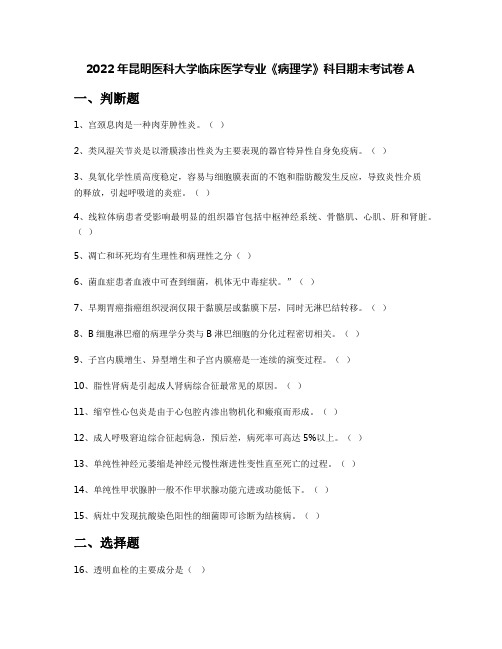
2022年昆明医科大学临床医学专业《病理学》科目期末考试卷A一、判断题1、宫颈息肉是一种肉芽肿性炎。
()2、类风湿关节炎是以滑膜渗出性炎为主要表现的器官特异性自身免疫病。
()3、臭氧化学性质高度稳定,容易与细胞膜表面的不饱和脂肪酸发生反应,导致炎性介质的释放,引起呼吸道的炎症。
()4、线粒体病患者受影响最明显的组织器官包括中枢神经系统、骨骼肌、心肌、肝和肾脏。
()5、凋亡和坏死均有生理性和病理性之分()6、菌血症患者血液中可查到细菌,机体无中毒症状。
”()7、早期胃癌指癌组织浸润仅限于黏膜层或黏膜下层,同时无淋巴结转移。
()8、B细胞淋巴瘤的病理学分类与B淋巴细胞的分化过程密切相关。
()9、子宫内膜增生、异型增生和子宫内膜癌是一连续的演变过程。
()10、脂性肾病是引起成人肾病综合征最常见的原因。
()11、缩窄性心包炎是由于心包腔内渗出物机化和瘢痕而形成。
()12、成人呼吸窘迫综合征起病急,预后差,病死率可高达5%以上。
()13、单纯性神经元萎缩是神经元慢性渐进性变性直至死亡的过程。
()14、单纯性甲状腺肿一般不作甲状腺功能亢进或功能低下。
()15、病灶中发现抗酸染色阳性的细菌即可诊断为结核病。
()二、选择题16、透明血栓的主要成分是()A.红细胞B.血小板小梁C.中性粒细胞D.纤维蛋白E.网状纤维17、白细胞渗出到损伤部位,包括如下过程()A.边集和滚动、黏附和游出、趋化作用B.边集和滚动、趋化作用、黏附和游C.趋化作用、边集和滚动、黏附和游出D.趋化作用、黏附和游出、边集和滚E.黏附和游出、边集和滚动、趋化作用18、产气英膜杆菌感染可引起()A.干性坏疸B.湿性坏疸C.气性坏疽D.脂肪坏死E.液化性坏死19、下列哪些细胞属于不稳定细胞()A.骨母细胞和平滑肌细胞B.表皮细胞和间皮细胞C.心肌细胞和神经细胞满D.肾小管上皮细胞和肝细胞E.唾液腺和涎腺的上皮细胞20、低分化的肿瘤特点是()A.异型性小B.预后好C.瘤细胞呈明显的巢状排列D.转移风险低E.恶性程度高21、下列哪一种物质中毒可引起周围神经系统病变,出现脱下垂或足下垂,还可刺激牙跟使近齿跟处的色素沉着()A.铅B.汞C.锅D.砷E.氟22、引起急性弥漫性增生性肾炎患者水肿的主要原因是()A.肾小管重吸收功能降低B.继发性醛固酮增多C.肾小球滤过率减少,毛细血管通透性增高D.低蛋白血症E.促红细胞生成素分泌减少30、引起急性弥漫性增生性肾炎患者水肿的主要原因是()A.肾小管重吸收功能降低B.继发性醛固酮增多C.肾小球滤过率减少,毛细血管通透性增高D.低蛋白血症E.促红细胞生成素分泌减少23、常出现砂粒体的甲状腺疾病是()A.胎儿型腺瘤B.慢性淋巴细胞性甲状腺炎C.弥漫性非毒性甲状腺肿结节期D.髓样癌E.乳头状癌24、乳腺癌的癌前病变是()A.乳腺增生症B.纤维囊性乳腺病伴不典型增生C.硬化性腺病D.乳腺导管内乳头状瘤E.纤维腺瘤25、原发性胆汁性肝硬化是()A.自身免疫性疾病B.细菌感染引起C.结石造成的胆道阻塞引起D.慢性化脓性胆管炎E.中华分枝睾吸虫引起26、急性感染性心内膜炎最常见的病原体是()A.金黄色葡萄球菌B.肺炎球菌C.流感杆菌D.淋球菌E.草绿色链球菌27、家族性高胆固醇血症属于()A.血浆蛋白病B.受体蛋白病C.膜转运蛋白病D.运输性蛋白病E.蛋白质构象病28、患者,男,60岁,头疼、癫痫伴神经状态的改变,临床诊断为恶性神经系统肿瘤。
昆明医科大学病理学2019年考博真题考博试卷
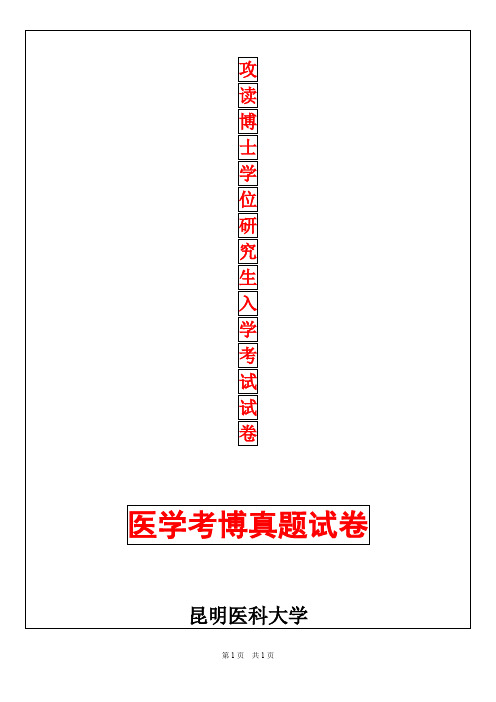
医学考博真题试卷
昆明医科大学
第1页 共1页
2019 年攻读博士学位研究生入学考试试题
考试科目:病理学 注意:所有答案一律写在答题纸上,写在试题纸上或其他地方一律不给分。
一、简答题(40 分) 1. 肺动脉血栓的后果 2. 慢性肝炎的分型 s 3. 滋养细胞病理改变 4. 伤寒病理改变 5. 三阴乳腺癌的病理改变 二、论述题(60 分) 1. 干细胞在细胞增殖和组织修复中的作用。 2. 血栓形成的因素和条件。 3. 肝硬化的病理和临床联系。 4. 非小细胞癌的分子学分型和临床价值。 5. 细胞芯片在病理诊断的应用前景。
病理考试试题和答案

病理考试试题和答案一、选择题(每题2分,共40分)1. 病理学是研究()的科学。
A. 疾病的发病机制B. 疾病的临床表现C. 疾病的病理变化D. 疾病的预防和治疗答案:C2. 细胞凋亡与坏死的主要区别在于()。
A. 细胞膜完整性B. 细胞核的变化C. 细胞质的变化D. 细胞器的变化答案:A3. 炎症的基本病理变化包括()。
A. 组织细胞损伤B. 血流动力学改变C. 血管通透性增加D. 所有上述选项答案:D4. 动脉粥样硬化的病变基础是()。
A. 动脉壁的炎症B. 动脉壁的纤维化C. 动脉壁的脂质沉积D. 动脉壁的钙化答案:C5. 恶性肿瘤的生物学特性包括()。
A. 快速生长B. 侵袭和转移C. 易复发D. 所有上述选项答案:D6. 肝硬化时,肝脏的病理变化主要表现为()。
A. 肝细胞的广泛坏死B. 肝细胞的再生结节形成C. 纤维组织的广泛增生D. 肝小叶结构的破坏答案:D7. 风湿性心脏病的病变基础是()。
A. 心脏瓣膜的炎症B. 心脏瓣膜的钙化C. 心脏瓣膜的纤维化D. 心脏瓣膜的坏死答案:A8. 胃溃疡的病变部位通常位于()。
A. 胃底B. 胃体C. 胃窦D. 幽门答案:C9. 慢性支气管炎的主要病理变化是()。
A. 支气管壁的炎症B. 支气管壁的纤维化C. 支气管壁的扩张D. 支气管壁的钙化答案:A10. 肾小球肾炎的病变基础是()。
A. 肾小球的炎症B. 肾小球的纤维化C. 肾小球的坏死D. 肾小管的炎症答案:A11. 肺结核的病变特点是()。
A. 干酪性坏死B. 肉芽肿形成C. 空洞形成D. 所有上述选项答案:D12. 心肌梗死的病变特点是()。
A. 心肌细胞的坏死B. 心肌间质的出血C. 心肌间质的炎症D. 所有上述选项答案:D13. 脑梗死的病变特点是()。
A. 脑组织的坏死B. 脑组织的出血C. 脑组织的软化D. 脑组织的炎症答案:C14. 甲状腺功能亢进症的病变特点是()。
A. 甲状腺滤泡的增生B. 甲状腺滤泡的萎缩C. 甲状腺滤泡的坏死D. 甲状腺滤泡的炎症答案:A15. 糖尿病的典型病理变化是()。
- 1、下载文档前请自行甄别文档内容的完整性,平台不提供额外的编辑、内容补充、找答案等附加服务。
- 2、"仅部分预览"的文档,不可在线预览部分如存在完整性等问题,可反馈申请退款(可完整预览的文档不适用该条件!)。
- 3、如文档侵犯您的权益,请联系客服反馈,我们会尽快为您处理(人工客服工作时间:9:00-18:30)。
1、hyaline degeneration 概念及分型。
2、滋养层细胞疾病包括什么?他们之间有什么共同点,又有什么区别?3、A动脉粥样硬化和高血压病所致心、肾、脑病变有什么不同?B高血压病颗粒性固缩肾是怎么形成的?C 高血压病小动脉病变是什么?4、大叶性肺炎分哪几个自然分期,有什么并发症?5、肠阿米巴、肠伤寒、肠菌痢的区别?6、结核球是来自哪些病变,临床上怎么治疗,为什么?7、良性肿瘤和恶性肿瘤的区别?8、流行性脑脊髓膜炎和乙脑的区别?9、胃癌种植转移于卵巢是什么诊断?胃癌转移途径有哪些?10、萎缩的概念及病理性萎缩类型?11、thrombus 概念及分型?12、坏死的基本病变?1 、简述下肢申报静脉血栓脱落后,栓子的运行途径和对机体造成影响(10 分)。
2、肉芽肿是由什么成分组成的?简述肉芽肿的作用、演变及瘢痕形成的过程(10 分)。
3、简述继发性肺结核各种类型互相转变的规律(10 分)。
4、简述肿瘤性增殖和非肿瘤性增殖的特点及二者的区别(8 分)。
5、何谓Abscess和Phlegmonous?二者的区别是什么(10分)。
6、简述粥样硬化动脉的发生发展过程(10分)。
7、简述凋亡细胞的形态学特点(6 分)。
8、男性患者,65 岁,反复咳嗽、咳痰10 年余,冬季加重。
近半年来感心悸、气急。
1周前发热,体温38C左右。
查体:颈静脉充盈,桶状胸,肺部可闻及湿性啰音,肝肿大,腹水,双下肢水肿。
X 线检查提示肺部散在小灶状阴影。
( 1 )患者患哪些疾病,请写出所患疾病名称( 5 分)。
(2)试述患者所患疾病直接的相互关系及发病机制(10分)。
9、请写出可导致呕血的疾病或病变,至少写出3种,并简述它们的疾病特点(10分)。
10、C rescent 是哪种疾病的特征性病变,并简述这种疾病的病理表现(5 分)。
11、何谓Cervical Intraepithelial neoplasm ?并简述其分级的主要依据( 6 分)。
昆明医学院2015 年博士生招生入学考试病理学试题1 坏疽的定义,分类,病理特点2 结节性甲状腺肿和甲状腺腺瘤区别3 良性与恶性胃溃疡区别4 原发性和继发性固缩肾区别5 病例题,羊水栓塞的诊断,诊断依据,羊水物质到肺部血管原因,死因分析6 类上皮定义,常见疾病7 肝脏占位病变病例分析8 霍奇金淋巴瘤的分类,病理学特点9 假膜性炎的概念,常见疾病及其特点10 副瘤综合症的概念,举例1.什么是坏疽,其发生机制和病变特点?2. 38岁女性,因右上腹痛半月入院。
影像学检查发现右肝后叶有3.5cm占位, HBsAg(+),AFP(-). 请列出该患者最可能患的三种疾病,并说明病理特点?3. 胃镜下良恶性溃疡的鉴别?4. 霍奇金淋巴瘤病理特征,分类?5. 什么是副肿瘤综合症,举例说明?6. 结节性甲状腺肿和甲状腺腺瘤肉眼和镜下区别?7. 什么是假膜性炎?举例说明其病理特征?8. 高血压固缩肾与慢性肾盂肾炎固缩肾区别?9. 病例分析:女性,26岁,足月分娩,宫缩乏力,使用催产素、产钳助产分娩。
后出现阴道流血不止,失血量约3000ml。
血不凝,填塞等止血措施无效,经抢救无效死亡。
尸体解剖发现:双肺淤血水肿,细小动脉及毛细血管有黄色颗粒状物质和毛发状物质。
(1) 诊断:(2) 为什么细小动脉及毛细血管有黄色颗粒状物质和毛发状物质?其途径?。
(3) 死亡原因?1. 举出3个不同器官硬化及病变2. 举出4个肉芽肿性炎及镜下特点3. 中年男,咳血痰,左肺上叶占位性病变,考虑病变(列3 个)及各自特点4. 大叶性肺炎、菌痢、伤寒(风湿性心包炎?记不清了)病变异同5. 宫颈癌转移途径及部位6. Congestion, Thrombosis, Embolism 和Infarction 有何关系7. 心肌梗死部位、病变及致死原因8. 列出可发生血尿的3 个病的病变并及血尿机制9. 肝硬化伴门脉高压引起腹水的原因和机制10. Herniation 的类型、好发部位、病变、结果11. 慢性胃溃疡愈合的过程12. 什么是变性?水肿和脂肪变的区别1、胃溃疡愈合的过程。
2、淤血、血栓形成、梗死、栓塞的关系。
英文的。
3、肺上叶有个占位,分析哪几种可能。
4、心肌梗死的好发部位,病变特点。
5、炎性肉芽肿有哪几种?6、腹水形成的机制。
7、纤维化见于那些病变?8、水肿和脂肪变性的区别。
一、英文名词解释(30 分,每个 3 分)说明:原试题只有英文,无中文提示1、atrophy 萎缩2、carcinoma in situ 原位癌3、mirror image cell 镜像细胞4、congestion 淤血5、embolism 栓塞6、tuberculoma 结核球又称“结核瘤”7、exudation 渗出8、hydrocephalus 脑积水9、heart failure cell 心衰细胞10、crescentic glomerulonephritis 新月体性肾小球肾炎二、问答题(70 分,每题10 分)1、中年男性,痰中带血,左锁骨上淋巴结肿大,X 线示肺门阴影。
最有可能的诊断是?镜下特点?2、请就原因、病变范围、形态特点、基因调控、意义等方面比较坏死和凋亡的区别?3、肿瘤性增生与炎症、损伤修复性增生有何区别?4、你所学的疾病中那些可以导致上消化道出血,至少举出 3 种疾病,简述其病变特点。
5、简述浸润性肺结核与继发性肺结核其他类型之间的关系。
6、简述宫颈癌的发生发展过程。
7、男性,57 岁,既往有心绞痛病史,心前区疼痛一周,经治疗症状缓解,今上厕所突然晕厥,抢救无效死亡。
尸检:主动脉壁增厚,内膜可见灰黄色斑块,主动脉局部内膜分离,其间可见血凝块,冠状动脉内膜增厚,狭窄。
问题1:该患者的死亡原因是什么?2:叙述心血管病变形成的过程。
一、名词解释:(每题 3 分,共30 分)1.Metaplasia2.Granulation tissue3.Paget disease4.Infarct5.Primary complex6.Gumma7.Piecemeal necrosis8.Reed-Sternberg cell9.Aschoff body10.Abscess二、问答题:(每题10 分,共70 分)1.肝硬化时假小叶是如何形成的,假小叶有哪些形态特点?2.按照肿瘤的命名原则,请列举发生于前臂的良恶性肿瘤各10 个。
3.从病因、发病机制、病理变化、主要临床表现和影像学特点比较大叶性肺炎与小叶性肺炎的不同点。
4.请举出5 种导致锁骨上淋巴结肿大的疾病或病变,并简述肿大淋巴结的病变特点。
5.尸体解剖发现死者双肾体积肿大,包膜紧张,颜色暗红,表面及切面散在出血点,肾皮质增宽。
镜下大多数肾小球体积增大,球囊内细胞数目显著增多,肾小管腔内见蛋白、红细胞和白细胞。
试分析:(1)该病例的病理诊断是什么?(2)死者生前可能出现哪些临床表现,请用病理变化予以解释。
6.请以化脓性阑尾炎为例,试述炎症的结局。
7.虎斑心、绒毛心、扁桃心、梨形心、靴形心各见于什么疾病或病变,试述其形态特点一、10个英文名词解释(30 分)1、空洞2、假小叶3、假结核结节4、副肿瘤综合征5、鬼影细胞6、槟榔肝7、白色血栓8、异型性9、含铁小结10、脂褐素二、七个问答题(70 分)1、动脉粥样硬化病理变化的发生发展过程。
2、引起肺硬化的几种病变特点及后果(至少3 种)。
3、中年女性,直肠癌根治术后下肢血栓形成的原因及影响。
4、引起脑转移性肿瘤的五种最可能的肿瘤,它们的病变特点及转移途径。
5、肠结核、肠伤寒、肠阿米巴,细菌性痢疾病变特点及结局。
6、冷脓肿、肝阿米巴脓肿、嗜酸性脓肿、神经脓肿各有何特点,与通常所说的脓肿有何不同。
7、引起纤维素性炎的疾病特点和结局。
一,名词解释(每题3分,共30分) traumatic neuroma 外伤性神经瘤fistula 瘘tubercle 结节organization 机化metastasis 转移neuronophagia 噬神经细胞linitis plastica 皮革胃inflammatory mediator 炎症介质atheroma 动脉粥样硬化cervical intraepithelial neoplasia (CIN) 宫颈上皮内瘤二,问答题(每题10分,共70分)1,简述小叶性肺炎,肾盂肾炎,流行性脑脊膜炎的病变共性和不同点(病因,发病年龄, 感染途径和病变特点) .2. 病人出现血尿,请分析可导致血尿的疾病和病变特点(至少3种) .3. 试述良性高血压晚期脑,心脏和肾脏的主要病理改变及后果.4. 病人的手指被刀切伤,深达肌层,试述伤口的愈合过程和影响伤口愈合的因素.5. 以肺癌为例, 试述恶性肿瘤的扩散规律.6. 试述心衰细胞,枭眼细胞,伤寒细胞,镜影细胞和泡沫细胞见于何种疾病或病变以及镜下形态特点.7, 患者,男,50 岁,因呕血急诊入院.既往患乙型肝炎16年.查体见面部和胸部有蜘蛛痣,腹壁静脉怒张,腹水征阳性.实验室检查: HBsAg(+),HBcAb(+),HBeAg(+),ALT 明显增高,AFP 明显增高.B 超检查有大小不等的结节. 请分析:(1) 该病人患何疾病? (2) 该疾病的发生发展过程? (3) 请解释为何出现上述临床表现?。
